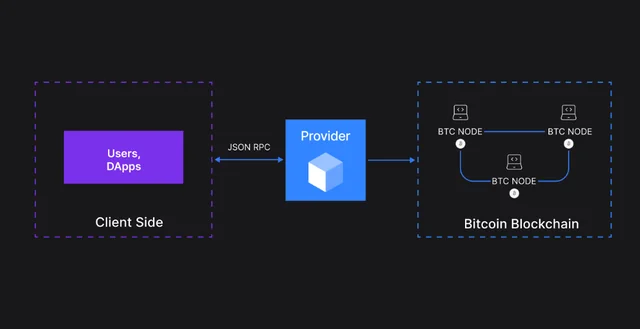Understanding Bitcoin Nodes and RPC Functions

In 2024, we've witnessed a remarkable surge in developer interest and demand for dependable Bitcoin node providers. This surge comes amidst the introduction of cutting-edge technologies like zero-knowledge proofs and the rising popularity of non-fungible tokens (NFTs) within the ecosystem.
Ethereum and its scalability options such as Polygon is another popular choice more favored by developers seeking to build smart contract-powered decentralized applications of advanced functionality and diverse use cases.
Let's investigate the growing appeal of infrastructure services and their contribution to improving accessibility to Bitcoin, Ethereum, and its respective Layer-2 solutions.
Understanding Web3 Infrastructure
To begin with, let's clarify what Bitcoin or Polygon RPC means when we talk about infrastructure.
It starts with crypto nodes "“ fundamental elements necessary for the functioning and operation of a blockchain network.
Utilizing powerful hardware and dedicated software, they function as data transmitters, transaction validators, and blockchain data storage for networks like Bitcoin and Ethereum.
For developers looking to integrate cryptographic features into their applications and transition them into Web3 products interacting with nodes is indispensable. It's through this communication with nodes that developers can leverage blockchain functionality and integrate it seamlessly into their applications.
What are RPC Nodes?
Nodes that can handle Remote Procedure Calls (RPC) play a crucial role for blockchain-based product and service developers.
These nodes allow developers to remotely send requests for specific actions or data retrieval related to the blockchain network.
Importantly, with RPC-enabled Bitcoin nodes or Polygon RPC developers do not need to manage their own local servers to interact with the protocol.
Bitcoin nodes
For Bitcoin developers, nodes serve as a bridge for interacting with the blockchain, simplifying the process of creating dApps that support BTC operations.
RPC enables applications to communicate directly with the network to request data stored on the ledger, create new addresses or check balances, and send cryptocurrency from one address to another.
Ethereum is versatile, supporting various decentralized applications, smart contracts, and protocols. Bitcoin's main utility lies in facilitating peer-to-peer transactions and store of value, making it highly valued in the realm of DeFi.
Polygon RPC
While Ethereum has traditionally been one of the most popular blockchains for developing and deploying smart contract-powered dApps, developers are increasingly turning to Layer-2 solutions like Polygon.
By leveraging Polygon RPC, developers can overcome Ethereum's scalability limitations and build high-performance dApps that offer improved user experiences and lower transaction costs.
This feature is crucial for dApps that require fast and inexpensive transactions, such as DeFi protocols, NFT marketplaces, and gaming platforms.
Why Choose Node Provider Solutions
Many services are making efforts to improve access to the infrastructure needed for crypto-based projects by hosting Bitcoin and Polygon RPC nodes and sharing access to them. These platforms allow developers to quickly connect to blockchain networks without spending time setting up servers
An extended list of advantages includes the following:
- Offering a simple way for users to interact with blockchain networks, even if they're not technical experts;
- Users don't have to bear the expenses for setting up and maintaining their own servers;
- Providing access to a variety of blockchain protocols via Bitcoin nodes, Polygon RPC, and beyond;
- Team of experts assisting with onboarding and troubleshooting.
With that, developers can leave the technical management tasks to the professionals who run the node services, allowing users to focus on their own projects without worrying about infrastructure setup and maintenance.
Accessing RPC Nodes: GetBlock Guide
GetBlock has established itself as a trusted name in the blockchain sector, offering reliable node services since 2019. Their platform facilitates seamless connections to over 55 blockchain networks, with Polygon RPC and Bitcoin nodes being part of the service.
Accessing Ethereum, or L2 nodes, such as Polygon RPC via GetBlock is straightforward "“ users simply register on the website using a Web3 wallet and retrieve an API to directs all their requests to the network they want to interact with.
With support for both private servers and a more cost-efficient shared infrastructure option, the service offers flexibility to suit your specific needs.
The service offers versatility, presenting users with options for private servers or shared infrastructure to accommodate diverse needs. Additionally, users enjoy complimentary tariffs for testing purposes, along with a generous allowance of 40,000 daily requests.
In essence, GetBlock and other renowned providers uphold robust performance standards, often hard to achieve in-house.
Wrapping Up
Blockchain is a democratic technology, where anyone can participate by running their own Bitcoin nodes. On the other hand, infrastructure provider services offer a more practical solution for those seeking easy access to BTC or Polygon RPC, as well as a great extent of other protocol nodes "“ all from one platform.